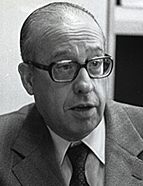

He wanted a learning unit which would lay the ground for a different logic for higher education but that was something that his colleagues (and not the authorities of those days as he himself wrote) could not understand. That was even the case of some of his colleagues who apparently were very close to him. Perhaps they feared an ascendancy that would preclude them from defending their own very specialized fields of knowledge… The model was that of the École Pratique des Hautes Études, as envisioned by Magalhães Godinho, interdisciplinary in all situations, which after all was not what happened in Paris… But what came to be did not improve in any way what the three Faculty of Arts were able to achieve.
Vitorino Magalhães Godinho was not appointed chair of History. He was pushed (or thought it best to move) to Sociology where he eventually created a group of disciples and followers who knew how to combine Social Sciences and History: Francisco Bethencourt, Rui Santos, Pedro Tavares de Almeida, Jorge Pedreira, Diogo Ramada Curto (who eventually drifted away from his master). People who either worked with him or who kept his company also joined this group, such as David Justino, Maria Eugénia Mata, Nuno Valério and Jorge Crespo. Joaquim Romero Magalhães, Aurélio de Oliveira, João Marinho dos Santos were not included. These were the people who supported the first phase of the journal Revista de História Económica e Social, launched by the group of disciples from the Instituto Superior de Economia e Gestão [Higher Institute for Economics and Management] (1979-1989). It was also in the 1980s that the Associação Portuguesa de História Económica e Social [Portuguese Association of Social and Economic History] was founded, with an ever-growing number of members and relevant events, which Magalhães Godinho chaired and to which he lent his support.
Never faltering, always open to cooperation whenever perceiving the need to intervene, he was appointed director of the Biblioteca Nacional de Lisboa [Lisbon National Library] in 1984, a position for which he was the most obvious candidate due both to his preparation and vocation. Alas, he had little time to put in place a well-thought-out plan by means of which he aimed to bring the Biblioteca to the leading position and prestige it had enjoyed in the days of Jaime Cortesão and Raul Proença. Being unable to do this was extremely painful for Vitorino Magalhães Godinho; he had allowed himself to become entangled in the ungodly warped ways of a public administration in which he had no faith. Failing to raise the Biblioteca Nacional to its rightful prominent place was also a severe blow to Portuguese culture.
